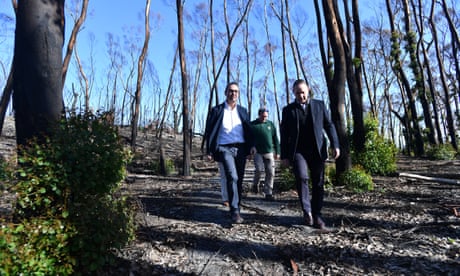- by foxnews
- 23 May 2025
Environmental policies are taking a back seat in the SA election. Should voters be worried?
Environmental policies are taking a back seat in the SA election. Should voters be worried?
- by theguardian
- 18 Mar 2022
- in news

The last time South Australians went to the polls to vote in a new government, the state had become a battlefield in a bitter national debate on the climate crisis.
In the aftermath South Australians became collateral damage in a national culture war over the climate crisis, renewable energy and how best to respond to an increasingly volatile environment.
Four years later, as South Australians go back to the polling booth this Saturday, the major parties have been relatively quiet on the climate crisis and environmental issues.
Residents of Kangaroo Island and the Adelaide Hills are yet to fully recover from the Black Summer Bushfires and headlines from the catastrophic floods in New South Wales and Queensland have dominated during the campaign, but the climate crisis has largely taken a back seat as debate focuses on a crisis in the health system.
Even with bipartisan support for the transition to renewable energy and the state having a head start on other jurisdictions, South Australia is not without its problems.
Emissions from power generation are falling, but according to the Department for Environment and Water those from road transport are growing fast. They are now the biggest source of emissions in the state.
The government is instead relying on its environmental record. It promises to continue work on the expansion of port infrastructure at Port Bonython on the Eyre Peninsula to facilitate hydrogen exports, as well as engaging in early talks to convert the Nyrstar lead refinery at Port Pirie to renewable energy and agricultural projects around carbon farming and lowering methane emissions.
The refusal to expand on what the party would do if returned to government has environment groups in South Australia concerned.
The Liberal Party, however, refused to participate, responding instead with a statement highlighting past achievements.
The chief executive of the Conservation Council SA, Craig Wilkins, stands by the scorecard, its methodology and the responses which are published on its website.
Against this backdrop the Labor opposition has sought to distinguish itself by putting a new $593m government-owned 200MW green hydrogen power plant at the centre of its election pitch.
The proposal was dismissed by the Liberal Party, which says the cost of construction was likely to blow out to $1.2b, while Whyalla locals have raised concerns over whether it will interfere with the migration of giant cuttlefish in the Upper Spencer Gulf.
Both Labor and the Greens say they would support a range of changes if in a position to decide policy after Saturday. They include an expansion of schemes to support solar and battery systems in low-income households, a world heritage application for the Great Australian Bight and the introduction of a state biodiversity act.
A looming issue that will carry over, and is likely to remain vexed whatever the election result, is the construction of a federal nuclear waste dump at Kimba on the Eyre peninsula.
- by foxnews
- descember 09, 2016
United Airlines flight returns to Hawaii after concerning message found on bathroom mirror; FBI investigating
United Airlines Flight 1169 to Los Angeles returned to Hawaii after a "potential security concern" aboard the plane. The FBI and police are investigating.
read more


